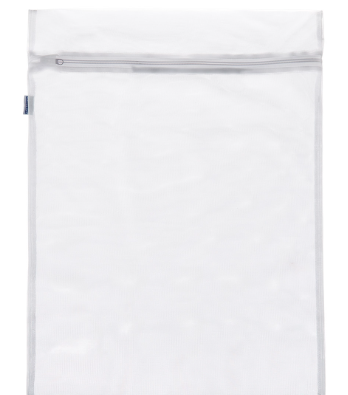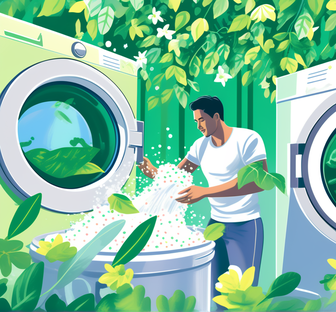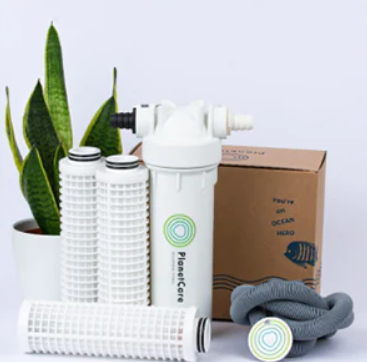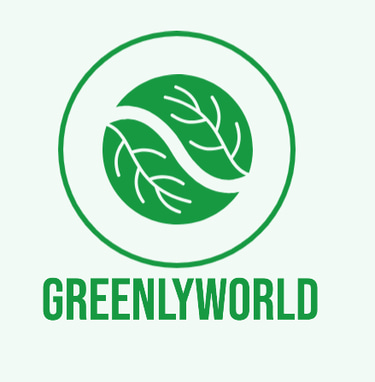The Best Microfiber and Microplastic Filters for Your Washing Machine
Micro Fiber Filters for reducing microplastics to our lakes and oceans.
HOME USE
GW Team
1/3/2024
Microplastics has recieved a lot of negative attention because of its harm it has made on the eco systems, mainly to lakes and oceans. However, in many cases we often hear about the plastic waste from plastic bottles, toothbrushes etc that are not recycled end in landfills and oceans. Very rarely, are we told that most clothes is made from synthetic fibres (usually plastic). When its washed in the washing machines, are emitting small fibres that end up in the lakes and oceans, and is responsible for minimum 1/4 of the microplastic population that ends in oceans. Therefore it's very important to mitigate this 'invisible' problem, that we invest in a Microfiber Filter, and luckily they come in affordable prices
Right below, we've made quick links with short notes, and further a more comprehensive explination of the filters, which we think is good to view (The choice is yours)
Quick notes
Planet Care - (Best in test - is placed outside the washing machine) - Ships to EU, UK, Canada, U.S, United Arab Emirates
Guppy Friend - (Very hands on - a bag is placed within the washing machine) - EU, UK, USA and Canada
Guppy Friend
Price range: $34.95
Materials Used
Mesh fabric constructions withstands washing
Features
Spacious 50 x 74 cm bag fits standard loads
Secure zipper enclosure retains contents in wash
Hydrophobic fabric barriers microfiber discharge
Corners designed for easy fiber removal post-wash
Reduces fiber shedding and protects clothing integrity
Filters escaping fibers while retaining its own
Daily usage reminds consumers' purchasing and laundry habits
Super easy and handy to use
Use only at maximum 40 °C
Multilingual instructions for proper usage and to ensure your washing bag can withstand for a long time
Sustainability Practices
Reduces microplastic pollution entering lakes and oceans by up to 86%
Reinforces responsible manufacturing through durable design
Raises consumer awareness of laundry impacts on environment
Closed-loop filtration system empowers enduring protection
Encourages considered choices in synthetic clothing purchases
Plastic-free eco-friendly packaging
Overall
The durable and user-friendly Guppy Friend washing bag sets the gold standard for sustainably washing synthetics. Thoughtful features and stringent validation establish circular solutions guarding precious waterways.
Summary
Cons and Pros of The Best washing bag:
The washing bag's biggest advantage is how easy it is to use it, since it only requires the synthetic clothes in the bag, and then wash each time. So no installation is required. Price wise it's a bit cheaper but the difference is only around $20, when converted from euro to dollars. You have to manually remove the microfibers each jam, which for some can be tiredsome, and for others it could be a fun activity. The wear and tear of the bag is also something to be cautios about since there are some guidelines you have to follow to ensure it doesnt break.


Key take aways
Roughly 14 mio. of microplastics have reached the oceans and is increasing each year. Moreover, globally between 16 - 35 % of microplastic in the oceans are from synthetic textiles. That is mainly from washing machines which is hugely underrated. Another underrated part are waste water treatment plants which can actually catch between 60 - 99 % of all microfibres in the sewage sludges. The problem in many instances is over 50 % of this microfiber is used directly in land applications as a replacement of fertilizers, according to Statistics for California. A small percentage is incenirated completely, which is done by a few countries in Europe, such as Netherlands, Germany, Switzerland, Austria and Slovenia where majority is incenirated. Unfortunately, there are few countries in Europe, such as Portugal, Ireland, UK and Spain that apply a minimum of 75 % of sewage sludge in land applications.
This ultimately becomes 'choose your poison' where waste incineration releases harmful chemicals and pollutants to the atmosphere, while applying microplastics in landfills ends in our food which is not good either. The solution is not so straighforward, but cathing the microfibres during washing with the filters seems to be making a huge difference. Choosing organic food over non-organic is also advised (in our opinion), washing less often at lower temperatures seems to be making a positive difference as well. Policy makers also play a significant role, to making changes in the laws to reduce incineration and reducing application of microfibres in land applications, and making laws that ensures microfiber filter are mandatory for any washing machine.
Sources:
https://blog.planetcare.org/are-wastewater-treatment-plants-really-the-solution-for-microfiber-pollution/
https://planetcare.org/en-int/pages/wastewater-treatment-plants-are-not-the-solution
https://www.eea.europa.eu/publications/microplastics-from-textiles-towards-a


Planet Care's Micro Filter
Price Ranges: €59.50
Materials Used
Filter housing and components made from durable, BPA-free plastics
Reusable filter cartridges trap microfibers effectively
Features
Stops 90% of microfibers from escaping in the wash cycle
Fits front and top loading washing machines
1 cartridge lasts up to 20 washes depending on load
Simple replacement of cartridges once full
Easy installment (10 minutes and its done). They show tutorials in case your washing machine is placed in different positions and where the filter may fit.
Certification
3rd party lab tested for filtration effectiveness from Slovenian Labs, Italian research institutions, and Swedish as well.
Oceanic Global's Blue Standard: It means Planet Care has a responsibility for the planet and all it sustains
Sustainability Practices
Closed loop system ensures no microfibers pollute oceans
Cartridges are reused after refurbishing up to 95% of filters
Remaining 5% are recycled responsibly
Shipping costs covered for return and reuse of filters
Eliminates waste from single-use alternatives
By purchasing their filter, you're saving the use of 52 plastic bags per year (pretty good)
Their goal: Saving 500 tons of microfiber emissions to enter the oceans within the next 5 year.
They offer to recycle all the microfibres caught (for EU and UK citizens)
They helped France (French Government) to implement a law from 2025 that all washing machines must include a filter.
Shipping
Planet Care ships to the UK, Europe, U.S, Canada and United Arab Emirates. Their recycling program is available for EU and UK citizens at the moment and is free of charge.
Planet Care (Reviews/Ratings):
4.5/5 - (165+)
Overall
The PlanetCare washing machine microfiber filter is a sustainable solution for modern laundering. By establishing a reusable, return-and-reuse scheme it maintains a closed microfiber lifecycle, which truly makes Planet Care stand out. In this regard, Individual actions accumulate to absolve our aquatic allies of synthetic microfibers and especially microplastics. Planet Care's goal is that every household that uses washing machines will be using microfiber filter to protect our oceans and ecosystems.
Therefore if you have a washing machine, we highly recommend you get a microfiber1 filter, and if you live in the countries we've listed then you're lucky to have the opportunity to get one!
Check their microfiber filter here: Planet Care's Micro Fiber Filter


Contacts
greenlyworld@hotmail.com
